Fresh from our post-production office, the GISEB 2022 video has finally arrived! 😉 Come have a look!
Music: www.Bensound.com

Fresh from our post-production office, the GISEB 2022 video has finally arrived! 😉 Come have a look!
Music: www.Bensound.com
by Nick Rickert ’23
Last week Evan and I were delighted to attend Theater Bremen’s performance of the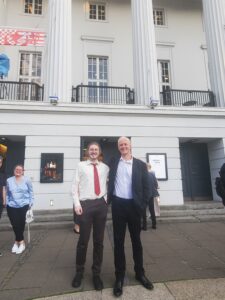 classic German musical play “Die Dreigroschenoper” (The Threepenny Opera), written by Bertolt Brecht with music composed by Kurt Weill and first performed in Berlin in 1928. This was our first time attending a theatrical performance in Bremen. Having only read a brief synopsis of the narrative beforehand, we came to find that the production was much less of what one might expect from an opera but rather a musical supported by a modestly sized jazz ensemble (with no conductor!). I wouldn’t call myself an avid musical goer, but I was enthralled by the lively assortment of characters and fantastic music.
classic German musical play “Die Dreigroschenoper” (The Threepenny Opera), written by Bertolt Brecht with music composed by Kurt Weill and first performed in Berlin in 1928. This was our first time attending a theatrical performance in Bremen. Having only read a brief synopsis of the narrative beforehand, we came to find that the production was much less of what one might expect from an opera but rather a musical supported by a modestly sized jazz ensemble (with no conductor!). I wouldn’t call myself an avid musical goer, but I was enthralled by the lively assortment of characters and fantastic music.
Adapted from an 18th-century English ballad opera, “Die Dreigroschenoper” tells the precarious love story between the antihero Macheath (Mackie Messer), a prominent gangster, and Polly Peachum, whose father controls the beggers of London and is determined to put Macheath in prison after the two become married (not to mention tying the knot just days after meeting for the first time!). I was immersed as soon as the curtains opened silently to reveal a rugged wooden floor with a steep slope and the beggars laying in darkness.
 I was stunned by the singing voices of Polly and Macheath, whose dialogue and ballads easily stole the stage whenever they appeared. In between these moving scenes Evan and I couldn’t help but chuckle at every move of the corrupt chief of police “Tiger” who broke the fourth wall by having a short interaction with the drummer, breaking one of their cymbals. I also found it heartwarming that since it was the last performance of this production, the director bade thoughtful farewells to several cast members leaving the theater company. Later that evening I couldn’t help but hum ‘Die Moritat von Mackie Messer’ to myself.
I was stunned by the singing voices of Polly and Macheath, whose dialogue and ballads easily stole the stage whenever they appeared. In between these moving scenes Evan and I couldn’t help but chuckle at every move of the corrupt chief of police “Tiger” who broke the fourth wall by having a short interaction with the drummer, breaking one of their cymbals. I also found it heartwarming that since it was the last performance of this production, the director bade thoughtful farewells to several cast members leaving the theater company. Later that evening I couldn’t help but hum ‘Die Moritat von Mackie Messer’ to myself.
“I thought the program was phenomenal. German culture is full of some of the most friendly and innovative minds that I’ve ever come into contact with. From the heightened level of sophistication seen in the Mercedes Benz factory to the attention to detail in the art of brewing beer- I learned so much about business abroad here and I’m super grateful for all of the experiences I had the pleasure of enjoying while abroad!”
(Kayden Tucker ’22)
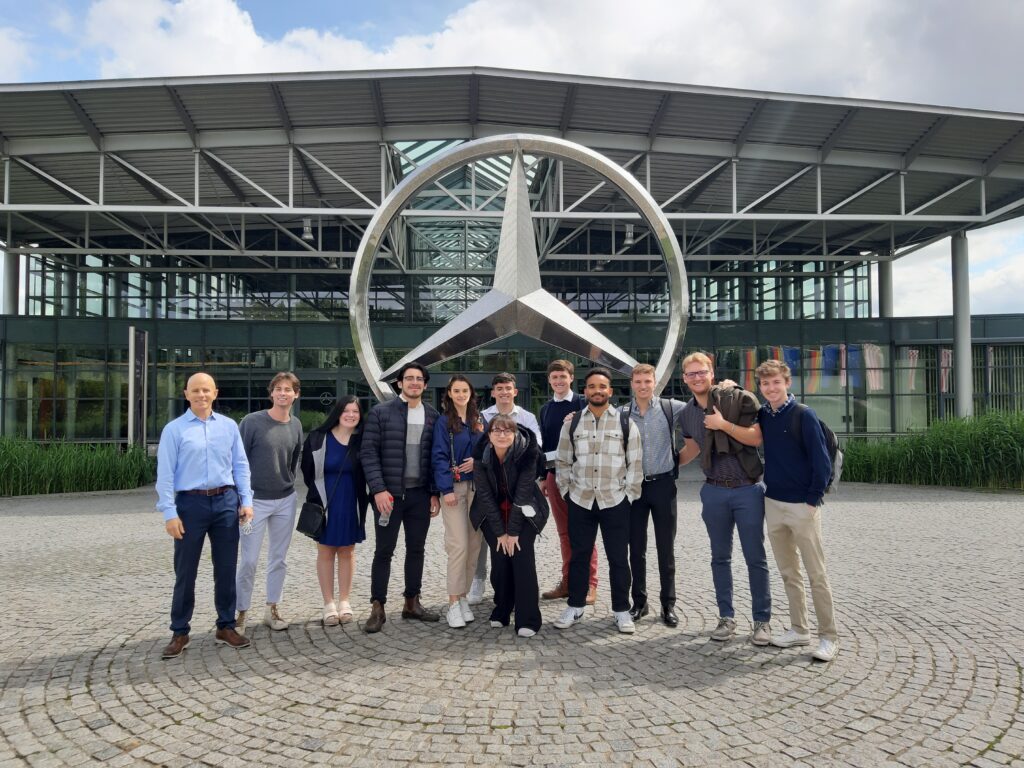
“My time in Bremen, Germany with the GIS program was for sure a time to remember. The Dickinson Program and students currently studying abroad were extremely helpful in preparing us and making a country I have never been to feel like home for two weeks. I was amazed at learning the German culture and learning a bit of the German language on the side. As I had never been to Germany before, I had a wonderful time taking in every experience. Our time visiting local businesses was very eye opening into the global markets and the ways COVID-19 altered business outputs/operations.” (William Giguere ’23)
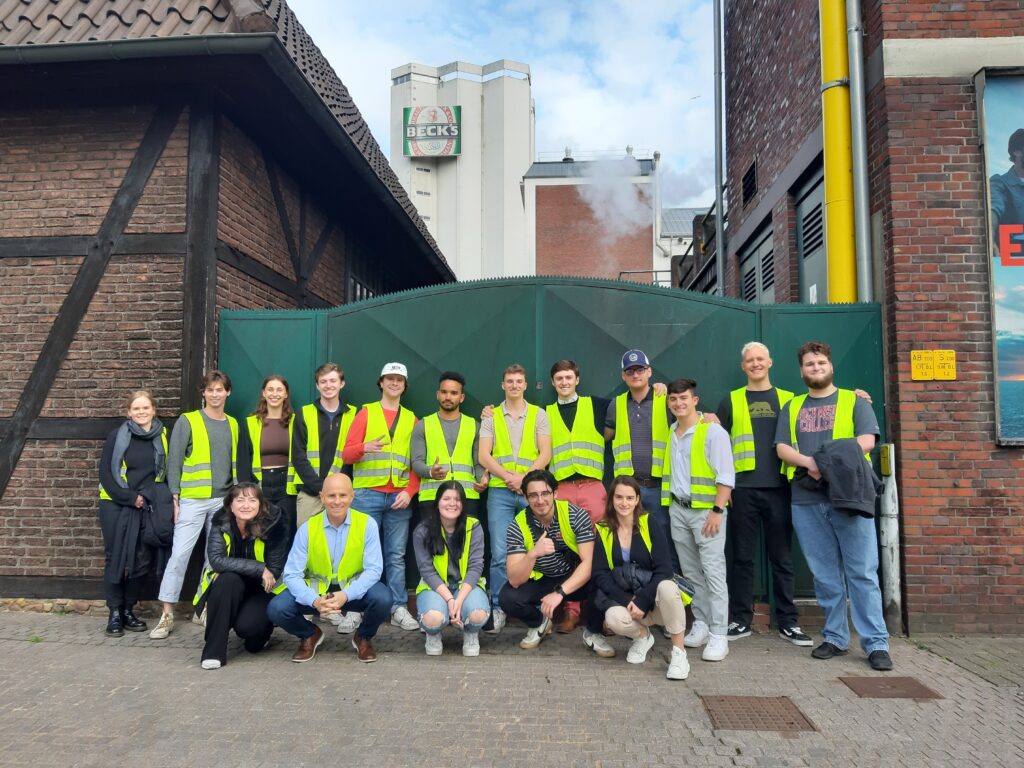
Photo credit: Durden Dickinson Bremen Program
As part of the GISEB (Globally Integrated Semester on Entrepreneurship in Bremen) program, we recently had the pleasure of welcoming some great visitors to Bremen! Check out these wonderful photos, taken by participant Sierra Stevens! Stay tuned for more photo and video content!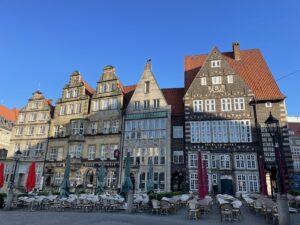
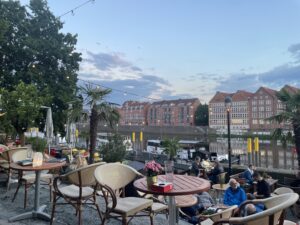 “I was initially very nervous about traveling to Germany. Not only had I never traveled out of the country, but I also didn’t know any German. Sophie’s expertise (an exchange student from Bremen University) calmed my nerves a bit, but I was still anxious about the trip.
“I was initially very nervous about traveling to Germany. Not only had I never traveled out of the country, but I also didn’t know any German. Sophie’s expertise (an exchange student from Bremen University) calmed my nerves a bit, but I was still anxious about the trip.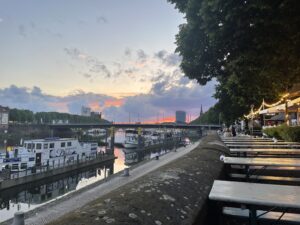
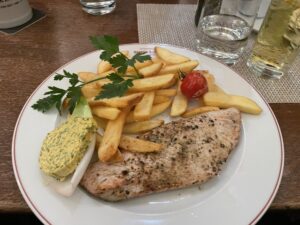 respectful manner.
respectful manner.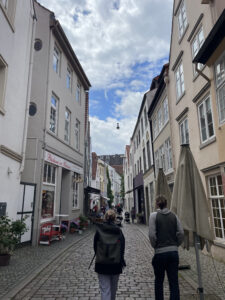
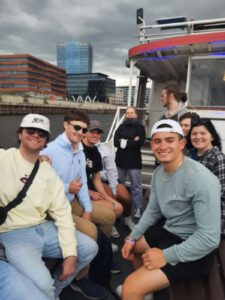
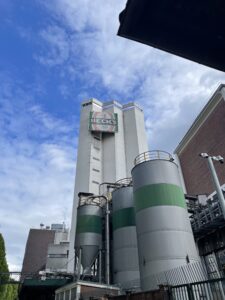
by Mac Tambussi ’23
The Werder Bremen parade was electric. For those who don’t know: Werder Bremen is the soccer team in Bremen that previously competed in the 2. Bundesliga. Last Sunday, for the final game of the season against Jahn Regensburg, they decisively destroyed Jahn Regensburg to obtain second place in the 2. Bundesliga, therefore getting promoted again to the First League!
Originally, I had intended on attending the game in person, but unfortunately, something went wrong with my tickets, and I wasn’t able to attend. Luckily, I, Nick, and Amanda went to one of our favorite local bars, Oililio, to watch the game. We had a blast watching Werder Bremen win and having a few beers!
After the game had ended, we decided to take the tram to the Bremen city district “Viertel” (“Quarter”) to see if the city was celebrating. It was an all-out party, with what I imagine most of the city of Bremen celebrating. It was awesome, everyone was singing, dancing, having beers, and there were even the occasional fireworks set off.
Later in the night, people started moving towards the end of the Viertel and we were not entirely sure why. It soon became apparent though because the entire Werder Bremen soccer team was coming through the city on a bus celebrating. They were having the times of their lives! After many hours of celebrating and meeting new friends, we all called it a night and headed back home. It was truly and electric experience that I will remember for the rest of my life.
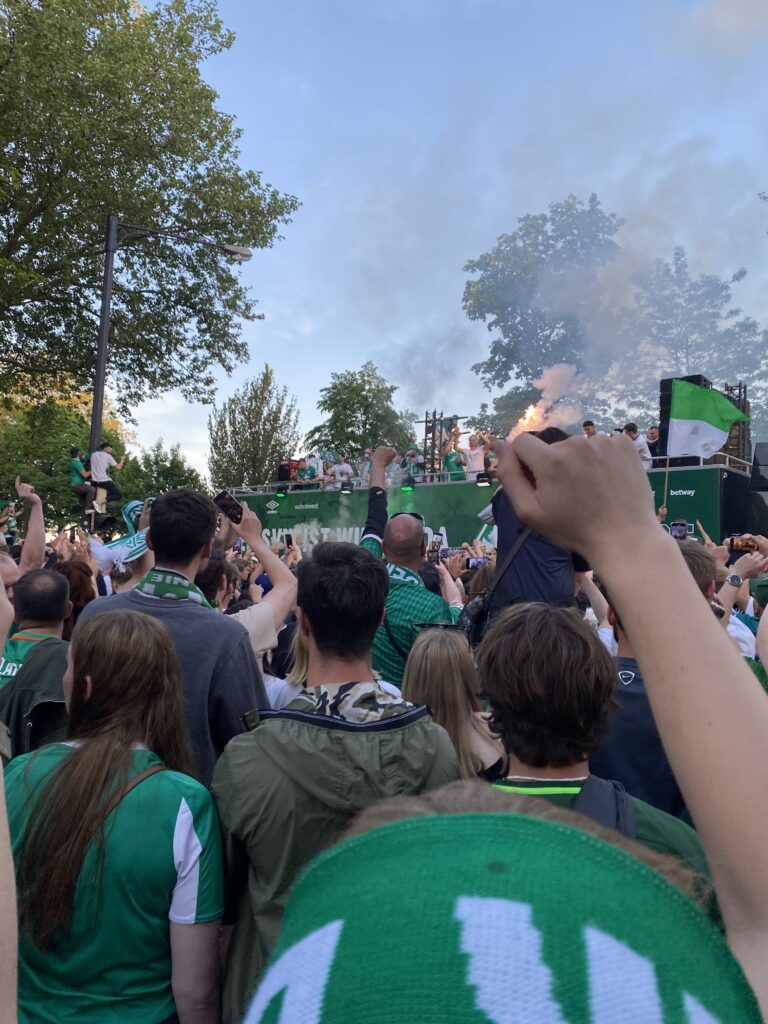
Photo credit: Durden Dickinson Bremen Program
To wrap up our little Vienna unit, we’d like to share this clip with you which sums up our favorite highlights during our lovely Vienna 2022 trip!
Baba Wien, see you next year! 🙂
Music: www.bensound.com
Video credit: Durden Dickinson Bremen Program
by Amanda Sorensen ’23 and Mac Tambussi ’23
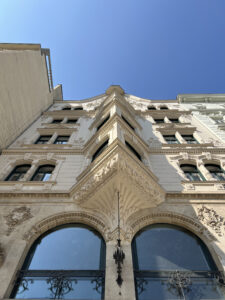
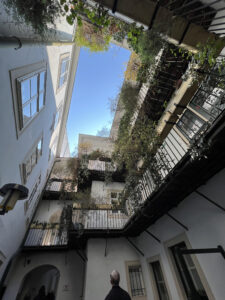
“I really enjoyed the architecture throughout Vienna. The Nationalbibliothek, Stephansdom, and Schönbrunn Palace were absolutely stunning, but what I loved most was wandering through the small streets and stumbling upon beautiful churches and colorful facades of beautifully constructed buildings.” (Amanda Sorensen)
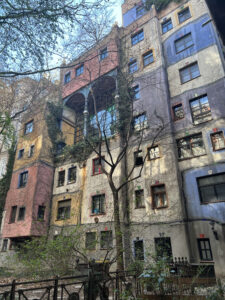
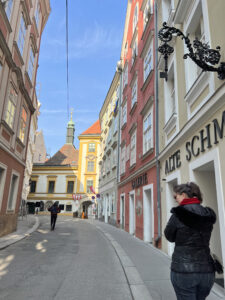
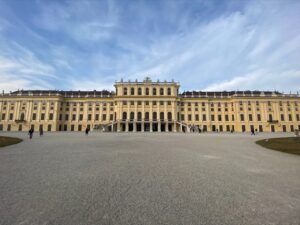 “Vienna was awesome. I have always heard and learned about how beautiful Vienna is, in class, movies, and books, but I they really don’t do it justice. Vienna took my breath away. It had a rich history with the Habsburgs and have a beautiful skyline and architecture. I really enjoyed trying traditional Wiener Schnitzel. What I enjoyed most of all, which came as a shocker to me, was the opera. The show was called
“Vienna was awesome. I have always heard and learned about how beautiful Vienna is, in class, movies, and books, but I they really don’t do it justice. Vienna took my breath away. It had a rich history with the Habsburgs and have a beautiful skyline and architecture. I really enjoyed trying traditional Wiener Schnitzel. What I enjoyed most of all, which came as a shocker to me, was the opera. The show was called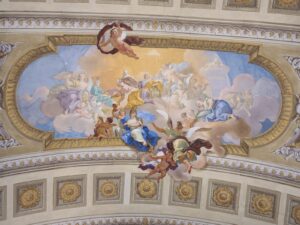 “Die Entführung aus dem Serail.” Despite our not-so-great seats, I thought the opera was electric. Vienna really was an awesome excursion!” (Mac Tambussi)
“Die Entführung aus dem Serail.” Despite our not-so-great seats, I thought the opera was electric. Vienna really was an awesome excursion!” (Mac Tambussi)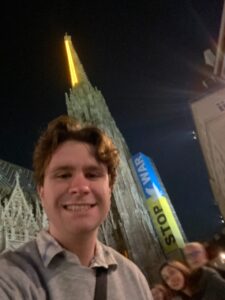
Photo credit: Durden Dickinson Bremen Program
by Kathryn Baker ’23 and Nicholas Rickert ’23
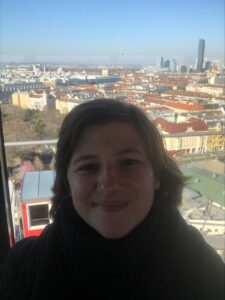 “My favorite part of our Wien excursion was exploring Prater Park! It is a large amusement park that is open 24 hours. One of the most famous landmarks in Wien is the Wiener Riesenrad (ferris wheel). We rode the Riesenrad and saw some of the most beautiful views of the city. After riding the Riesenrad, some of us walked around the park and got some food. I ate another Schokoapfel (apple covered in chocolate) and ice cream. I was surprised at how many ‘scary, haunted’ rides there were at Prater, there were at least five! Overall this is one of my favorite memories.” (Kathryn Baker)
“My favorite part of our Wien excursion was exploring Prater Park! It is a large amusement park that is open 24 hours. One of the most famous landmarks in Wien is the Wiener Riesenrad (ferris wheel). We rode the Riesenrad and saw some of the most beautiful views of the city. After riding the Riesenrad, some of us walked around the park and got some food. I ate another Schokoapfel (apple covered in chocolate) and ice cream. I was surprised at how many ‘scary, haunted’ rides there were at Prater, there were at least five! Overall this is one of my favorite memories.” (Kathryn Baker)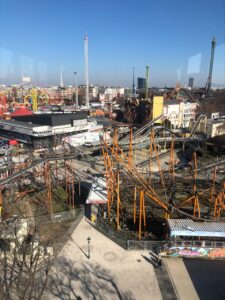
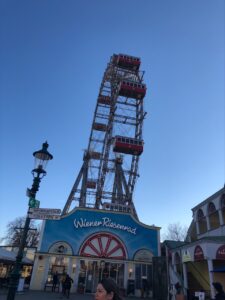
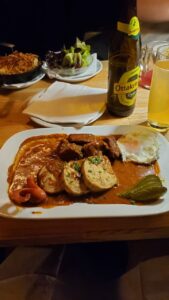 “Trying regional dishes and the enjoying unique local atmospheres in restaurants always leave me with positive and lasting impressions of a foreign city, and Vienna was no exception. Our group had the pleasure of being taken to dine in excellent traditional restaurants as well as Vienna’s famous ‘Cafe Demel,’ where I fell in love with a sweet dish called ‘Kaiserschmarrn’ which is like a pancake but much more delectable. Other highlights for me were the Viennese potato salad, Goulash, and of course Wiener Schnitzel. Combined with the lovely decor and a fine selection of beer, I don’t think I’ll be able to forget the restaurants!” (Nick Rickert)
“Trying regional dishes and the enjoying unique local atmospheres in restaurants always leave me with positive and lasting impressions of a foreign city, and Vienna was no exception. Our group had the pleasure of being taken to dine in excellent traditional restaurants as well as Vienna’s famous ‘Cafe Demel,’ where I fell in love with a sweet dish called ‘Kaiserschmarrn’ which is like a pancake but much more delectable. Other highlights for me were the Viennese potato salad, Goulash, and of course Wiener Schnitzel. Combined with the lovely decor and a fine selection of beer, I don’t think I’ll be able to forget the restaurants!” (Nick Rickert)
Photo credit: Durden Dickinson Bremen Program
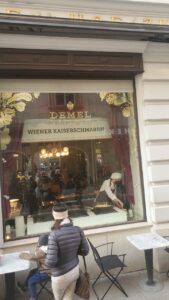
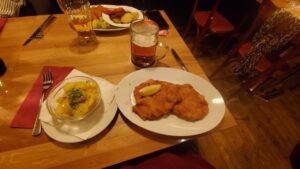
by Shannon Vogel ’23, Andrew Irvine ’23 and Evan Bates ’23
“The National Library was my favorite place we visited. The architecture and the amount of books felt straight out of a movie, and fit my dream image of the perfect library (complete with bookcase doors!) It was also interesting to learn that it was one of the first German language public libraries.” (Shannon)
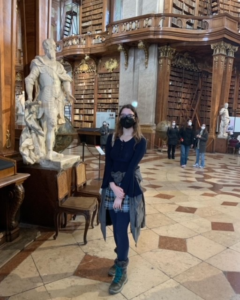
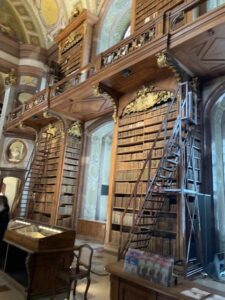
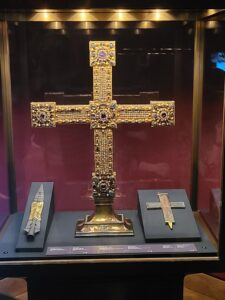 “On the first day of the excursion in Vienna, the group visited the Schatzkammer (Treasure Chamber) of Austria. Within the chamber lay centuries’ worth of priceless artifacts from various points of Austrian history. Some of the items included were coronation robes, tapestries, ceremonial swords with their sheaths, reliquaries of various saints and of religious items, and of course the crowns of various Holy Roman Emperors. Unfortunately, the Imperial Crown, believed to have been made for Otto I. (the Great) around 960 and later painted into a picture of the earlier Charlemagne (Karl der Große) who was crowned in 800, was off display for research purposes. Regardless, the treasures of Austria were an astounding journey through a millennium of history.” (Andrew)
“On the first day of the excursion in Vienna, the group visited the Schatzkammer (Treasure Chamber) of Austria. Within the chamber lay centuries’ worth of priceless artifacts from various points of Austrian history. Some of the items included were coronation robes, tapestries, ceremonial swords with their sheaths, reliquaries of various saints and of religious items, and of course the crowns of various Holy Roman Emperors. Unfortunately, the Imperial Crown, believed to have been made for Otto I. (the Great) around 960 and later painted into a picture of the earlier Charlemagne (Karl der Große) who was crowned in 800, was off display for research purposes. Regardless, the treasures of Austria were an astounding journey through a millennium of history.” (Andrew)
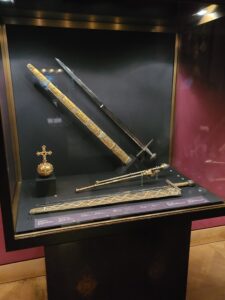
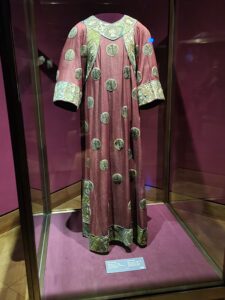
“One of my favorite attractions in Vienna might have been the Kaisergruft (the imperial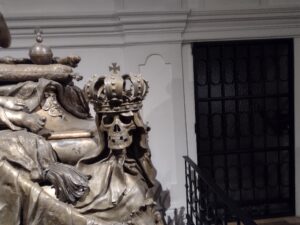 crypt of the Habsburg family). It was certainly odd to walk amongst the sarcophagi of ancient rulers but the sheer opulence and uniqueness of each coffin struck me. I think of all the decorations on the coffins, the skulls and figures were my favorite. They were wonderfully macabre, sometimes with wings or the cast crowns of their long since fallen domains. I was also quite interested in the fact that the family separated
crypt of the Habsburg family). It was certainly odd to walk amongst the sarcophagi of ancient rulers but the sheer opulence and uniqueness of each coffin struck me. I think of all the decorations on the coffins, the skulls and figures were my favorite. They were wonderfully macabre, sometimes with wings or the cast crowns of their long since fallen domains. I was also quite interested in the fact that the family separated 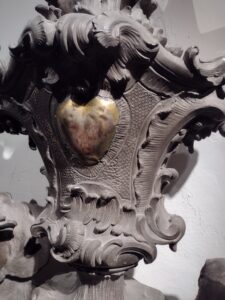 their organs to send to their family or original kingdom like the heart container in the picture here. The biggest coffin was for 2 rulers and was so large it had it’s own room and had to be lowered from the street above and the roof built above it. There are even modern burials here with one even from 2011 I believe. Certainly a lovely visit for those who love skulls and grim things. I heartily recommend.” (Evan)
their organs to send to their family or original kingdom like the heart container in the picture here. The biggest coffin was for 2 rulers and was so large it had it’s own room and had to be lowered from the street above and the roof built above it. There are even modern burials here with one even from 2011 I believe. Certainly a lovely visit for those who love skulls and grim things. I heartily recommend.” (Evan)
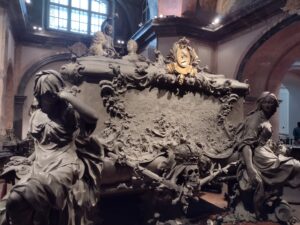
All pictures taken and provided by students or Dickinson staff.
by Dr. Janine Ludwig
As part of the EUASA Conference Committee, it gives me great pleasure to announce that the 2022 EUASA conference will take place on February 10th and 11th, via Zoom. Please join the European Association for Study Abroad, for a virtual conference intended for study abroad professionals based in Europe (although anyone is welcome to join us!). More details and free registration information can be found through the link below. We look forward to seeing you there!
Conference Website: https://www.euasa.org/